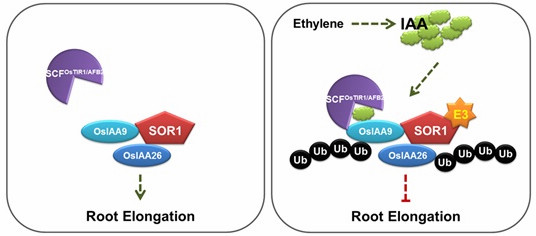Plant hormones ethylene and auxin synergistically regulate plant root growth and development. Ethylene promotes the biosynthesis and transport of auxin. Auxin receptors TIR1/AFB2 sense auxin and trigger the degradation of Aux/IAA proteins, which are transcriptional repressors, through ubiquitin/26S proteasome-mediated pathway.
Then, the transcriptional factors ARF are released to regulate the expression of downstream genes. How auxin regulates ethylene response at signaling level remains unclear.
Recently, a team led by Prof. ZHANG Jinsong and Prof. CHEN Shouyi at the Institute of Genetics and Developmental Biology, Chinese Academy of Sciences, identified a new factor MHZ2/SOR1 that acts downstream of TIR1/AFB2, and dissected how auxin signaling regulates ethylene response in rice root.
The researchers found that SOR1, a plant-specific E3 ubiquitin ligase, can directly ubiquitinate OsIAA26 protein and thus promote its degradation.
In addition, OsIAA9 can interact with SOR1 and inhibit its E3 ubiquitin ligase activity.
Different from OsIAA9, OsIAA26 is an atypical Aux/IAA protein and cannot be targeted for degradation by TIR1/AFB2 auxin receptors. In the absence of ethylene and auxin, OsIAA9 indirectly stabilizes OsIAA26 by inhibiting SOR1 E3 ligase activity. In the presence of ethylene or auxin, TIR1/AFB2 target OsIAA9 for degradation, by which SOR1 is released for OsIAA26 degradation.
These findings reveal that SOR1-OsIAA26 signal module acts downstream of TIR1/AFB2-auxin-OsIAA9 to regulate ethylene response.
The findings are published online in PNAS entitled "E3 ubiquitin ligase SOR1 regulates ethylene response in rice root by modulating stability of Aux/IAA protein".
This work was supported by National Natural Science Foundation of China, Ministry of Science and Technology of the People's Republic of China and the State Key Lab of Plant Genomics.
Figure 1. Model for regulation of auxin-mediated ethylene response (Image by IGDB)





